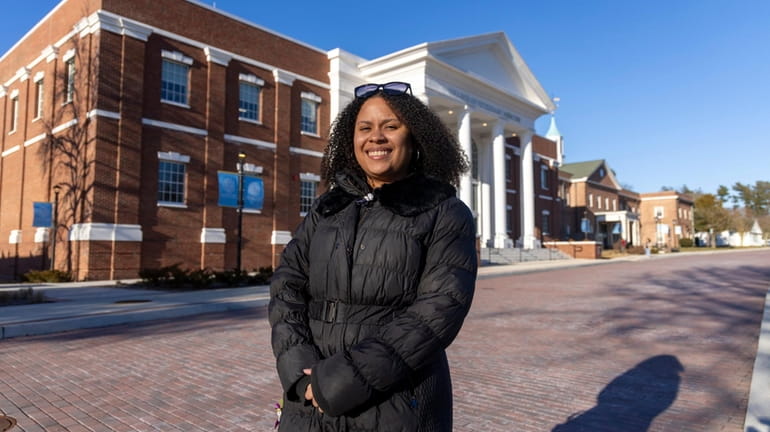New scholarship aims to help two Black students at Long Island University become veterinarians

Shania Allison is the first Long Island University student to receive a scholarship that intends to help young Black adults become veterinarians. Credit: Howard Schnapp
Shania Allison, whose childhood dog Alvin inspired her to pursue veterinary medicine, said that growing up in Forest Hills, she didn’t recall meeting a Black or Hispanic veterinarian — someone in the profession who looked like her.
Now, she’s the first Long Island University student to receive a scholarship that intends to help young Black adults become veterinarians — a job where 90% of practitioners are white.
“It may encourage others like technicians and assistants that look like me to think: ‘She was able to do it. Why can’t I?’ " she said Thursday. "And when parents bring in their children to the clinic, they will see me and think: ‘Maybe I want to become a vet, too, because I see she’s able to do it.’ ”
Only 1.3% of America’s 87,000 veterinarians are Black, even though a third of Black adults are pet owners, according to data from the U.S. Bureau of Labor Statistics and Pew Research Center.
Allison, 24, is of Puerto Rican and Black heritage. She began studying at the LIU College of Veterinary Medicine on its Brookville campus last fall.
The scholarship is funded by The Brady Hunter Foundation, a nonprofit based in Florida. It will pay for half the tuition for Allison and a second Black student with financial need from the city’s five boroughs. The other recipient is to be announced before the fall of 2025.
The tuition for 2023-24 at the LIU College of Veterinary Medicine is $58,366. When adding room and board and other expenses, the cost adds up to more than $86,000, according to the university.
LIU is one of only two universities in New York that offer an accredited veterinary college, according to the American Veterinary Medical Foundation. The other is Cornell University in Ithaca.
The LIU veterinary college began instruction in 2020 and will have its first four-year class graduate in the spring, the university said.
Only 10 out of the LIU veterinary college’s 317 students in the Doctor of Veterinary Medicine program were Black, according to a 2023 diversity data report from the American Association of Veterinary Medical Colleges. Nationwide, Black students accounted for only 3.6% of the students enrolled in U.S. colleges of veterinary medicine.
Yet diversity matters in the field of caring for people’s pets, said Eric Lerner, of Manhattan, The Brady Hunter Foundation’s director of special projects.
“With diversity, you have different outlooks and perspectives coming into the profession,” he said. “It adds to the quality of care.”
In her experience working at clinics, Allison said she has seen instances of clients opening up more when they see that their vet looks like them.
“They build a better connection with doctors that look like them because they feel they will understand them better,” she said.
Allison, who graduated from St. John’s University with no debt thanks to scholarships and family help, said the new scholarship will help her accumulate less debt when she graduates. She has already taken out loans to help pay for her first year at LIU and has worked per diem at an animal hospital in Manhattan.
The high cost of an education has been cited as one barrier that students, in particular those of color, face to enter the profession.
“I can see why it deters a lot of people from even trying,” Allison said. “They look at the cost and they think: ‘How will I pay for that?’ On top of that, some people are already coming in with debt from undergrad.”
Shania Allison, whose childhood dog Alvin inspired her to pursue veterinary medicine, said that growing up in Forest Hills, she didn’t recall meeting a Black or Hispanic veterinarian — someone in the profession who looked like her.
Now, she’s the first Long Island University student to receive a scholarship that intends to help young Black adults become veterinarians — a job where 90% of practitioners are white.
“It may encourage others like technicians and assistants that look like me to think: ‘She was able to do it. Why can’t I?’ " she said Thursday. "And when parents bring in their children to the clinic, they will see me and think: ‘Maybe I want to become a vet, too, because I see she’s able to do it.’ ”
Only 1.3% of America’s 87,000 veterinarians are Black, even though a third of Black adults are pet owners, according to data from the U.S. Bureau of Labor Statistics and Pew Research Center.
Allison, 24, is of Puerto Rican and Black heritage. She began studying at the LIU College of Veterinary Medicine on its Brookville campus last fall.
The scholarship is funded by The Brady Hunter Foundation, a nonprofit based in Florida. It will pay for half the tuition for Allison and a second Black student with financial need from the city’s five boroughs. The other recipient is to be announced before the fall of 2025.
The tuition for 2023-24 at the LIU College of Veterinary Medicine is $58,366. When adding room and board and other expenses, the cost adds up to more than $86,000, according to the university.
LIU is one of only two universities in New York that offer an accredited veterinary college, according to the American Veterinary Medical Foundation. The other is Cornell University in Ithaca.
The LIU veterinary college began instruction in 2020 and will have its first four-year class graduate in the spring, the university said.
Only 10 out of the LIU veterinary college’s 317 students in the Doctor of Veterinary Medicine program were Black, according to a 2023 diversity data report from the American Association of Veterinary Medical Colleges. Nationwide, Black students accounted for only 3.6% of the students enrolled in U.S. colleges of veterinary medicine.
Yet diversity matters in the field of caring for people’s pets, said Eric Lerner, of Manhattan, The Brady Hunter Foundation’s director of special projects.
“With diversity, you have different outlooks and perspectives coming into the profession,” he said. “It adds to the quality of care.”
In her experience working at clinics, Allison said she has seen instances of clients opening up more when they see that their vet looks like them.
“They build a better connection with doctors that look like them because they feel they will understand them better,” she said.
Allison, who graduated from St. John’s University with no debt thanks to scholarships and family help, said the new scholarship will help her accumulate less debt when she graduates. She has already taken out loans to help pay for her first year at LIU and has worked per diem at an animal hospital in Manhattan.
The high cost of an education has been cited as one barrier that students, in particular those of color, face to enter the profession.
“I can see why it deters a lot of people from even trying,” Allison said. “They look at the cost and they think: ‘How will I pay for that?’ On top of that, some people are already coming in with debt from undergrad.”

